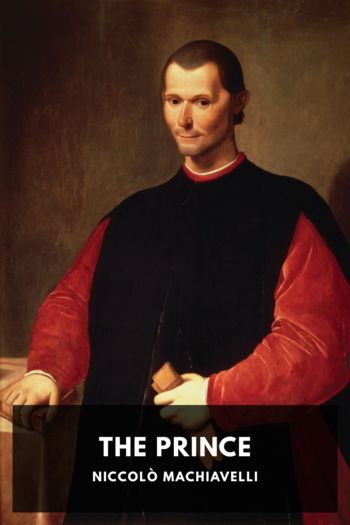The Prince, Niccolò Machiavelli [ebooks online reader .TXT] 📗

- Author: Niccolò Machiavelli
Book online «The Prince, Niccolò Machiavelli [ebooks online reader .TXT] 📗». Author Niccolò Machiavelli
As regards action, he ought above all things to keep his men well organized and drilled, to follow incessantly the chase, by which he accustoms his body to hardships, and learns something of the nature of localities, and gets to find out how the mountains rise, how the valleys open out, how the plains lie, and to understand the nature of rivers and marshes, and in all this to take the greatest care. Which knowledge is useful in two ways. Firstly, he learns to know his country, and is better able to undertake its defence; afterwards, by means of the knowledge and observation of that locality, he understands with ease any other which it may be necessary for him to study hereafter; because the hills, valleys, and plains, and rivers and marshes that are, for instance, in Tuscany, have a certain resemblance to those of other countries, so that with a knowledge of the aspect of one country one can easily arrive at a knowledge of others. And the prince that lacks this skill lacks the essential which it is desirable that a captain should possess, for it teaches him to surprise his enemy, to select quarters, to lead armies, to array the battle, to besiege towns to advantage.
Philopoemen,34 Prince of the Achaeans, among other praises which writers have bestowed on him, is commended because in time of peace he never had anything in his mind but the rules of war; and when he was in the country with friends, he often stopped and reasoned with them: “If the enemy should be upon that hill, and we should find ourselves here with our army, with whom would be the advantage? How should one best advance to meet him, keeping the ranks? If we should wish to retreat, how ought we to pursue?” And he would set forth to them, as he went, all the chances that could befall an army; he would listen to their opinion and state his, confirming it with reasons, so that by these continual discussions there could never arise, in time of war, any unexpected circumstances that he could not deal with.
But to exercise the intellect the prince should read histories, and study there the actions of illustrious men, to see how they have borne themselves in war, to examine the causes of their victories and defeat, so as to avoid the latter and imitate the former; and above all do as an illustrious man did, who took as an exemplar one who had been praised and famous before him, and whose achievements and deeds he always kept in his mind, as it is said Alexander the Great imitated Achilles, Caesar Alexander, Scipio Cyrus. And whoever reads the life of Cyrus, written by Xenophon, will recognize afterwards in the life of Scipio how that imitation was his glory, and how in chastity, affability, humanity, and liberality Scipio conformed to those things which have been written of Cyrus by Xenophon. A wise prince ought to observe some such rules, and never in peaceful times stand idle, but increase his resources with industry in such a way that they may be available to him in adversity, so that if fortune chances it may find him prepared to resist her blows.
XV Concerning Things for Which Men, and Especially Princes, Are Praised or BlamedIt remains now to see what ought to be the rules of conduct for a prince towards subject and friends. And as I know that many have written on this point, I expect I shall be considered presumptuous in mentioning it again, especially as in discussing it I shall depart from the methods of other people. But, it being my intention to write a thing which shall be useful to him who apprehends it, it appears to me more appropriate to follow up the real truth of the matter than the imagination of it; for many have pictured republics and principalities which in fact have never been known or seen, because how one lives is so far distant from how one ought to live, that he who neglects what is done for what ought to be done, sooner effects his ruin than his preservation; for a man who wishes to act entirely up to his professions of virtue soon meets with what destroys him among so much that is evil.
Hence it is necessary for a prince wishing to hold his own to know how to do wrong, and to make use of it or not according to necessity. Therefore, putting on one side imaginary things concerning a prince, and discussing those which are real, I say that all men when they are spoken of, and chiefly princes for being more highly placed, are remarkable for some of





Comments (0)